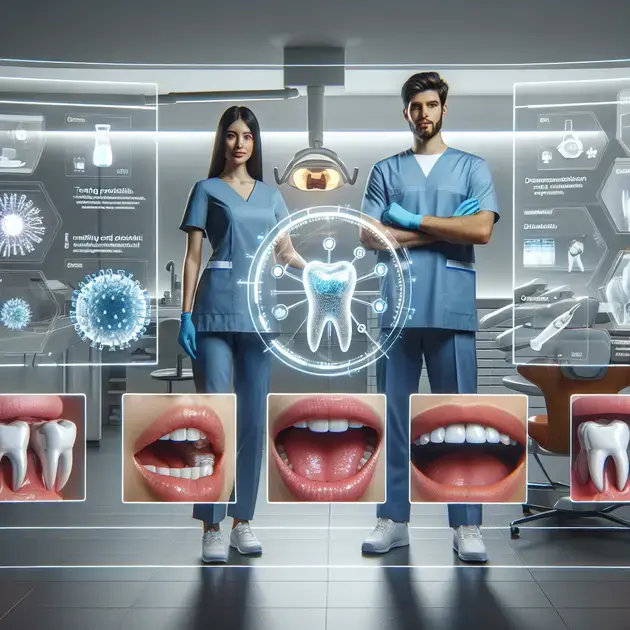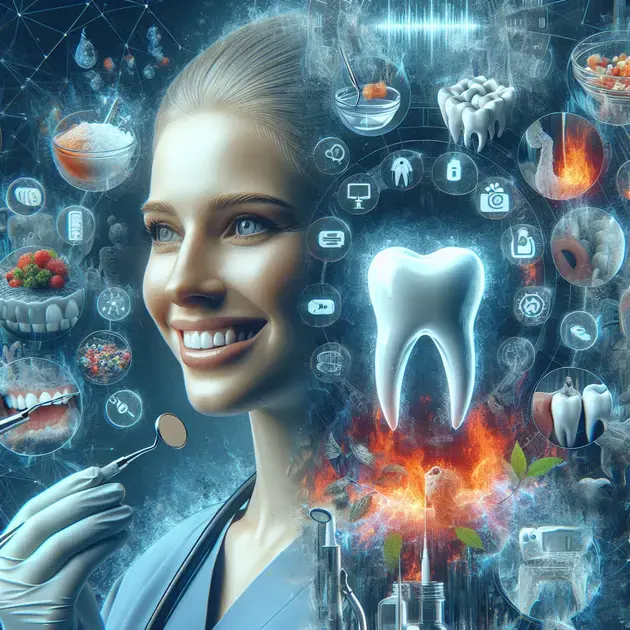When it comes to dealing with periodontitis, finding the best medication is crucial for successful treatment. In this comprehensive guide, we will explore the most effective options available to help combat this common dental condition.
With advancements in modern dentistry, there are now several medications that have shown promising results in treating periodontitis. From antibiotics to antiseptic mouthwashes, understanding the different types of medications and their benefits is essential in addressing this oral health issue.

Effective Medications for Periodontitis Treatment
Periodontitis is a serious gum infection that damages the soft tissue and destroys the bone that supports your teeth. To effectively treat periodontitis, various medications can be used in conjunction with professional dental care. Here, we will explore some of the most effective medications for periodontitis treatment and how they work.
1. Antibiotics
Antibiotics are commonly prescribed to combat the bacterial infection causing periodontitis. One popular antibiotic is doxycycline, which can be taken orally or applied directly to the infected areas. This medication helps reduce the size of periodontal pockets and control the bacterial growth.
2. Antiseptic Mouthwashes
Antiseptic mouthwashes contain active ingredients like chlorhexidine that help reduce plaque and gingivitis, which can exacerbate periodontitis. Using an antiseptic mouthwash as part of your oral hygiene routine can help control the bacterial load in your mouth and prevent further progression of the disease.
3. Prescription Mouthwash
In some cases, a prescription mouthwash containing an antimicrobial agent may be recommended by your dentist. These mouthwashes are designed to target the specific bacteria causing the infection and provide targeted treatment to the affected areas.
4. Pain Medication
For individuals experiencing pain and discomfort due to periodontitis, pain medication such as ibuprofen or acetaminophen may be prescribed to alleviate symptoms. These medications can help manage the pain while other treatments work to address the underlying infection.
5. Oral Antiseptics
Oral antiseptics like povidone-iodine solution can be used as a mouth rinse to reduce the bacterial load in the oral cavity. These antiseptics can help promote healing and prevent further infection in individuals with periodontitis.
Understanding Different Types of Medications
When it comes to treating periodontitis, different types of medications are used to target the infection and promote gum health. Understanding how each type of medication works can help you make informed decisions about your treatment plan.
1. Systemic Medications
Systemic medications, such as oral antibiotics, are taken internally and circulate throughout the body to combat the bacterial infection causing periodontitis. These medications can help reduce inflammation and control the spread of the infection.
2. Topical Medications
Topical medications are applied directly to the affected areas and can include gels, mouthwashes, or slow-release devices. These medications deliver targeted treatment to the gums and tooth roots, helping to reduce bacterial growth and promote healing.
3. Combination Therapies
Combination therapies involve using multiple medications together to enhance their effectiveness. For example, a combination of antibiotics and antiseptic mouthwashes may be prescribed to address both the bacterial infection and plaque buildup associated with periodontitis.
4. Maintenance Medications
Once periodontitis is under control, maintenance medications may be prescribed to prevent recurrence of the infection. These medications help support ongoing gum health and reduce the risk of developing further complications.
5. Consultation and Monitoring
It is essential to consult with your dentist or periodontist to determine the most suitable medications for your specific condition. Regular monitoring and adjustments to your medication regimen may be necessary to ensure the best treatment outcomes.
Benefits of Antibiotics and Antiseptic Mouthwashes
Antibiotics and antiseptic mouthwashes play a crucial role in the treatment of periodontitis by helping to eliminate bacteria and reduce inflammation in the gums. Understanding the benefits of these medications can help you maintain good oral health and prevent the progression of gum disease.
1. Bacterial Control
Antibiotics and antiseptic mouthwashes target the bacteria responsible for causing periodontitis, helping to control the infection and prevent further damage to the gums and supporting structures of the teeth.
2. Reduced Inflammation
By reducing the bacterial load in the mouth, antibiotics and antiseptic mouthwashes can help decrease inflammation in the gums. This can lead to a reduction in swelling, redness, and discomfort associated with periodontitis.
3. Improved Healing
Using antibiotics and antiseptic mouthwashes as part of your periodontal treatment plan can promote faster healing of the gum tissues. These medications create a more favorable environment for tissue regeneration and repair.
4. Preventative Maintenance
Continued use of antibiotics and antiseptic mouthwashes as prescribed by your dentist can help prevent recurrence of periodontitis. By maintaining good oral hygiene practices and following your medication regimen, you can support long-term gum health.
5. Professional Guidance
Your dentist or periodontist can provide guidance on the proper use of antibiotics and antiseptic mouthwashes to maximize their benefits. Following their recommendations and attending regular check-ups can ensure optimal results in managing periodontitis.

Different Approaches to Manage Periodontitis Symptoms
Periodontitis is a serious oral health condition that can lead to various symptoms such as gum inflammation, bleeding, and eventually tooth loss if left untreated. Fortunately, there are different approaches to manage these symptoms and prevent further complications. One effective method is through professional dental cleanings, where a dental hygienist removes plaque and tartar buildup that contribute to periodontitis.
In addition to professional cleanings, practicing good oral hygiene at home is crucial for managing periodontitis symptoms. This includes brushing at least twice a day, flossing regularly, and using an antiseptic mouthwash to reduce bacteria in the mouth. Furthermore, lifestyle changes such as quitting smoking and reducing stress can also help improve gum health and manage periodontitis symptoms.
For more severe cases of periodontitis, a dentist may recommend procedures such as scaling and root planing to deep clean the gums and tooth roots, or even surgery to repair damaged tissues. It’s important to work closely with your dental professional to determine the best approach for managing your periodontitis symptoms and maintaining good oral health.
Exploring Alternative Therapies for Periodontitis Relief
While traditional treatments like professional cleanings and surgery are effective for managing periodontitis, some individuals may prefer to explore alternative therapies for relief. One alternative therapy that has gained attention is acupuncture, which involves inserting thin needles into specific points of the body to alleviate pain and inflammation.
Another alternative therapy to consider is herbal medicine, which uses plant-based remedies to promote gum health and reduce inflammation. Herbs like chamomile, tea tree oil, and aloe vera have been studied for their potential anti-inflammatory properties and may offer relief for periodontitis symptoms when used properly.
In addition to acupuncture and herbal medicine, lifestyle changes such as following an anti-inflammatory diet rich in fruits, vegetables, and omega-3 fatty acids can also support gum health and alleviate symptoms of periodontitis. Consulting with a holistic healthcare provider or integrative dentist can help guide you in exploring alternative therapies for periodontitis relief.
The Link Between Diet and Periodontitis Prevention
The saying “you are what you eat” holds true when it comes to preventing periodontitis through diet. Consuming a well-balanced diet that is rich in nutrients can play a significant role in maintaining healthy gums and preventing gum disease. Foods high in sugar and processed carbohydrates can contribute to plaque buildup and inflammation, whereas foods high in antioxidants and vitamins can help strengthen the immune system and combat bacteria in the mouth.
Research has shown that certain foods like green tea, cranberries, and nuts contain compounds that have antibacterial and anti-inflammatory properties, which can benefit gum health and reduce the risk of periodontitis. Additionally, staying hydrated by drinking plenty of water can help flush out bacteria and food particles that can lead to gum disease.
Incorporating probiotic-rich foods like yogurt and kefir into your diet can also support oral health by promoting a healthy balance of bacteria in the mouth. Overall, making informed choices about what you eat can have a positive impact on preventing periodontitis and maintaining a healthy smile for years to come.
Conclusion
In conclusion, managing periodontitis symptoms requires a comprehensive approach that combines professional dental cleanings with diligent at-home oral hygiene practices. Regular visits to a dental hygienist for cleanings are essential in removing plaque and tartar buildup to prevent further complications associated with periodontitis. Additionally, adopting a daily routine of brushing, flossing, and using mouthwash can significantly improve gum health and reduce inflammation.
Alternative therapies
Exploring alternative therapies like acupuncture and herbal medicine can offer additional relief for individuals seeking non-traditional treatments. Acupuncture, known for its pain-relieving properties, and herbal remedies such as chamomile and tea tree oil may help manage periodontitis symptoms effectively. Embracing lifestyle changes, including following an anti-inflammatory diet rich in nutrients, can further support gum health and overall well-being.
Diet and prevention
The link between diet and periodontitis prevention underscores the importance of making nutritious food choices. Consuming foods high in antioxidants, vitamins, and probiotics can strengthen the immune system, combat oral bacteria, and reduce the risk of gum disease. Green tea, cranberries, nuts, and probiotic-rich foods like yogurt play a significant role in maintaining oral health and preventing periodontitis.
By incorporating a holistic approach that encompasses professional treatments, alternative therapies, and a balanced diet, individuals can effectively manage periodontitis symptoms and promote long-term oral health. It is crucial to work collaboratively with dental professionals and holistic healthcare providers to tailor a personalized plan that addresses specific needs and ensures a healthy smile for years to come.



